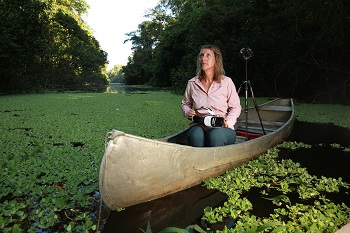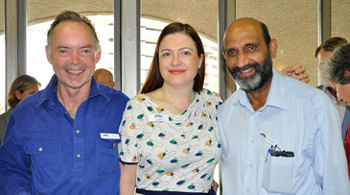
The Australian Academy of Science aims to be a leader in diversity and inclusion in Australia’s science sector. We are committed to supporting excellence in science, but we recognise that to achieve this we must celebrate and embrace diversity and inclusion in all its forms.
More about the Academy’s approach to diversity and inclusion
Watch our videos encouraging the nominations of diversity candidates
As only our Fellows can nominate candidates for election to the Academy, we encourage all our Fellows to nominate candidates from diverse backgrounds from across the nation.
To assist us to identify Fellowship candidates from a broad range of backgrounds, each year we invite over 300 leaders in the Australian STEM and tertiary sectors to suggest candidates to us by mid-June. The Academy’s Champions of Diversity (Fellows appointed in each area of science) assess the suggested candidates for their suitability for election, and an appropriate Fellow is then identified to nominate the candidate. This involves working closely with the candidate on the nomination, which the proposer must start by 31 July in our online nomination system, with the full nomination submitted by 31 August.
Each year the Academy may elect up to 24 new Fellows by ‘Ordinary Election’ and up to four additional Fellows by ‘Special Election’. In June 2025, the Fellowship comprised 634 Fellows, including 132 women.
The Academy’s Council may also elect up to two Corresponding Members each year from among distinguished scientists overseas. As at June 2025 there were 39 Corresponding Members in the Academy.
Candidates may be considered for up to 5 election rounds (or until they are elected). The next round is the 2026 election round (which opened July 1 2025 with the new Fellows announced in May 2026).
| Date | Activity |
|---|---|
| By Mid-June |
Candidates from diverse backgrounds may be suggested (in-confidence) to the Fellowship Officer by email to fellowship@science.org.au. Suggested candidates who are assessed by the Academy’s Champions of Diversity as suitable for election will then have an appropriate Fellow identified to nominate the candidate. |
| 1 July |
Online nomination system opens for Fellows to nominate new candidates (and to start updating nominations for their candidates who will be considered again in this round). |
| By 31 July |
All new nominations must be registered by 31 July. To register a candidate, start a new nomination in the system and enter and save the candidate’s name, email, gender, and the proposed Sectional Committee to assess the candidate. |
| By 31 August | All nominations must be completed and submitted by 31 August. This includes new nominations and updates to continuing nominations. |
| September to November |
13 selection committees, known as ‘Sectional Committees’, undertake unconscious bias training and then shortlist candidates within their discipline area/s to progress for further consideration. Additional independent referee reports are requested for shortlisted candidates. |
| By early February 2026 | Sectional Committees conduct their final deliberations to determine up to four candidates to recommend to Council. |
| March 2026 | Council considers all the recommended candidates and determines the final list of up to 24 candidates for the Fellows’ ballot for Ordinary Election, and up to 4 candidates for Special election. |
| April 2026 | Ballot count by Returning Officer and new Fellows declared elected (all Fellows advised under embargo). Two-thirds of the voting Fellows must agree to each candidate’s election. |
| End of May 2026 | New Fellows and Corresponding Members publicly announced. |

Since the 2024 Round, more flexibility in the weightings of the criteria for election have been adopted to enable Sectional Committees and Council to better assess contributions of candidates who may not have had a full-time research career path or opportunities to undertake leadership roles.
The weighting of criterion 1 is a minimum of 60% and a maximum of 85%, however, criteria 2 and 3 may also now be adjusted by the Sectional Committee (to range from 15 to 40% combined) with a minimum weighting of 10% for criteria 2 and 5% for criteria 3.
Proposers are not to choose weightings. This information is provided for reference only. The flexibility is for Sectional Committees to adjust the weightings as they see fit given the circumstances as described in the nomination. Normally the weighting used would be: 60:20:20. These changes are only to allow full appreciation of non-traditional career pathways, and any changes used by a committee need to be commented on in the Chair’s report to Council.

The Academy is committed to celebrating and supporting diversity within the Fellowship. Achievement is judged relative to opportunity, taking into account any breaks in, or late commencement of, career. Assessment is done in such a way as to not disadvantage gifted young scientists who have already made outstanding contributions to their discipline. Diversity dimensions within the Fellowship (including gender, age, culture, state and region of residence, emerging disciplines, and interdisciplinary science) will be further taken into-account by Council in considering the final list of candidates.
Each year the Council may elect up to four persons whose election would expand the diversity of the Fellowship and be of significant benefit to the Academy and to the advancement of science. It is expected that candidates for Special Election will be scientists, engineers, or inventors and have a high national and/or international profile and potential to advance the work of the Academy in science education, advocacy, policy, or international engagement. They may also have a strong record of science achievement, usually early in their career. Specially elected Fellows will have:
Special election candidates will be assessed using the following indicators of merit:

Information to Complete an Online Fellowship Nomination | 2026 Round
Fellows nominate candidates via the Academy’s nomination system. Information required includes:
A nomination is valid for five consecutive election rounds/years or until the candidate is elected. Proposers must update the nominations for their continuing candidates every year for the life of the nomination. After the nomination has expired and following a pause of two election rounds (two years), a new nomination for that candidate may be submitted.
Please email fellowship@science.org.au if you have any questions regarding the nomination process (including the eligibility of a candidate or suitability of a referee). Enquiries will be referred to the Secretary for Physical Sciences or the Secretary for Biological Sciences, where necessary.
You are welcome to share and embed our videos encouraging the nomination of diversity candidates for Fellowship and awards.
© 2026 Australian Academy of Science